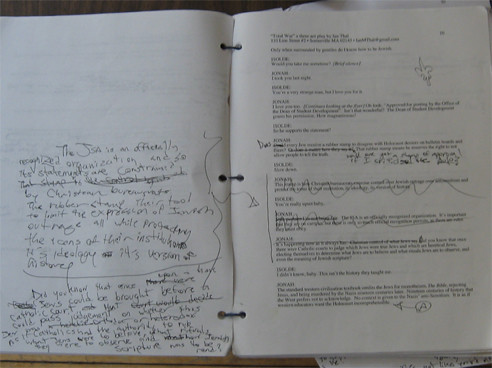 A few weeks back, I completed typing up the changes to my play due to the restructuring process I had mentioned some months ago, reformatted the script as a pdf and passed it along to some friends for critique. I used what seems like a never-ending schedule of rehearsals and performances to give myself a break from thinking about it, and when I could no longer avoid it, I printed up my own hard copy and began reading.
A few weeks back, I completed typing up the changes to my play due to the restructuring process I had mentioned some months ago, reformatted the script as a pdf and passed it along to some friends for critique. I used what seems like a never-ending schedule of rehearsals and performances to give myself a break from thinking about it, and when I could no longer avoid it, I printed up my own hard copy and began reading.
Working with a text on paper is radically different from with the same text inside of a word processor. The tactile experience of flipping pages and writing corrections in ink is more intimate than key strokes or mouse clicks and that greater intimacy causes me to more closely address the actual words of the 97-page script.
What strikes me about reading the current draft is how much a set of revisions I made out of economic necessity of eliminating several characters (it is simply unfeasible for a company to stage a play with so many characters) was also the artistically correct decision to make: the narrative came into greater focus and the underlying motivations of the characters became simultaneously more complex and more clear: making their relationships with one another more layered, and making more explicit the ideas that inform their actions . A character created through the compositing of two characters from the earlier drafts became very much the dramatic equal of the protagonist of the preceding drafts.
Interestingly enough: I also discovered that while I had previously conceived of the play as having three acts, that it makes more logical sense as a five act play-- and no adjustment of was needed beyond the renumbering of the scenes.
That said, as I await comments and dialogue from aforementioned friends, I am reading slowly, word for word, editing dialogue. I am seeing that process that seeks out a structure that best tells the story is not the same process that determines if characters is saying what they need to say in manner they need to say it at the precise moment they ought to speak. Dialogue that is merely functional, on second glance, could be poetic. Some dialogue suffers from having been edited far too many times. Some of these problems can only be solved by crossing several lines and writing something new in the margins or on the back of the preceding page.
[NOTE: reedited for style on August 16, 2008]
Thursday, May 22, 2008
Dialogue
Subscribe to:
Post Comments (Atom)



No comments:
Post a Comment